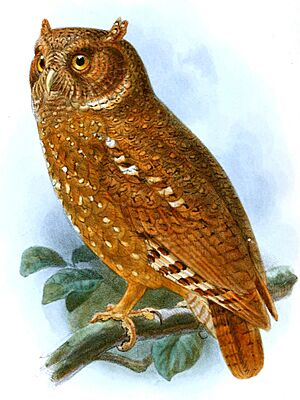Sandy scops owl facts for kids
Quick facts for kids Sandy scops owl |
|
|---|---|
 |
|
| An illustration of the holerythrus subspecies. | |
| Conservation status | |
| Scientific classification |
|
| Kingdom: | Animalia |
| Phylum: | Chordata |
| Class: | Aves |
| Order: | Strigiformes |
| Family: | Strigidae |
| Genus: | Otus |
| Species: |
O. icterorhynchus
|
| Binomial name | |
| Otus icterorhynchus (Shelley, 1873)
|
|
| Script error: The function "autoWithCaption" does not exist. | |
Script error: No such module "Check for conflicting parameters".
The sandy scops owl (Otus icterorhynchus) is a small owl that lives in Africa. It is also known as the cinnamon scops owl. This owl belongs to the family Strigidae, which includes most owl species.
Contents
About the Sandy Scops Owl
Scientists group animals based on how they are related. The sandy scops owl is part of a group of owls called Otus. Some scientists think it's closely related to the Sokoke scops owl. There are two main types, or subspecies, of the sandy scops owl. Some experts even think these two types might be different species! More research, like DNA testing, is needed to confirm this.
Types of Sandy Scops Owls
There are two recognized subspecies of the sandy scops owl:
- Otus icterorhynchus icterorhynchus: This type lives in West Africa.
- Otus icterorhynchus holerythrus: This type is found in northwestern central Africa.
What Does It Look Like?
The sandy scops owl is a small bird. It has a light reddish-brown color all over its body. Its face is plain, and it has a pale yellow beak and bright yellow eyes. You can easily spot a light stripe along its shoulders.
Adult sandy scops owls are pale reddish-brown. They have small white spots and buff-colored (light yellowish-brown) bars. Their belly and underside are lighter and more reddish, with buff bars and white spots. The tail, flight feathers, and upperwing feathers are reddish with black bars.
This owl is about 15 cm (5.9 in) long. Its wingspan, which is the distance from one wingtip to the other, is about 45 cm (18 in).
What Sound Does It Make?
The sandy scops owl makes a long whistling sound. It sounds like "twooo" and gets lower in pitch as it goes on.
Where Does It Live?
The sandy scops owl lives in different parts of the African tropical rainforest. It has been seen in several countries, including Guinea, Liberia, Ivory Coast, Ghana, Cameroon, Gabon, Congo, Democratic Republic of Congo, and the Central African Republic.
These owls prefer to live in lowland evergreen forests. They can also be found in forests with an open tree canopy or in areas where forests mix with scrubland.
How Does It Behave?
The sandy scops owl is rarely seen, so scientists don't know much about its daily life. It is probably active around dawn and dusk, which is called crepuscular. It mainly eats insects, especially grasshoppers and crickets. The breeding season for these owls is likely during February and March.
 | Aurelia Browder |
 | Nannie Helen Burroughs |
 | Michelle Alexander |


